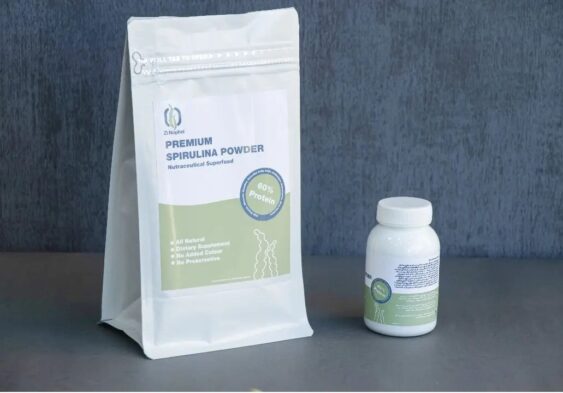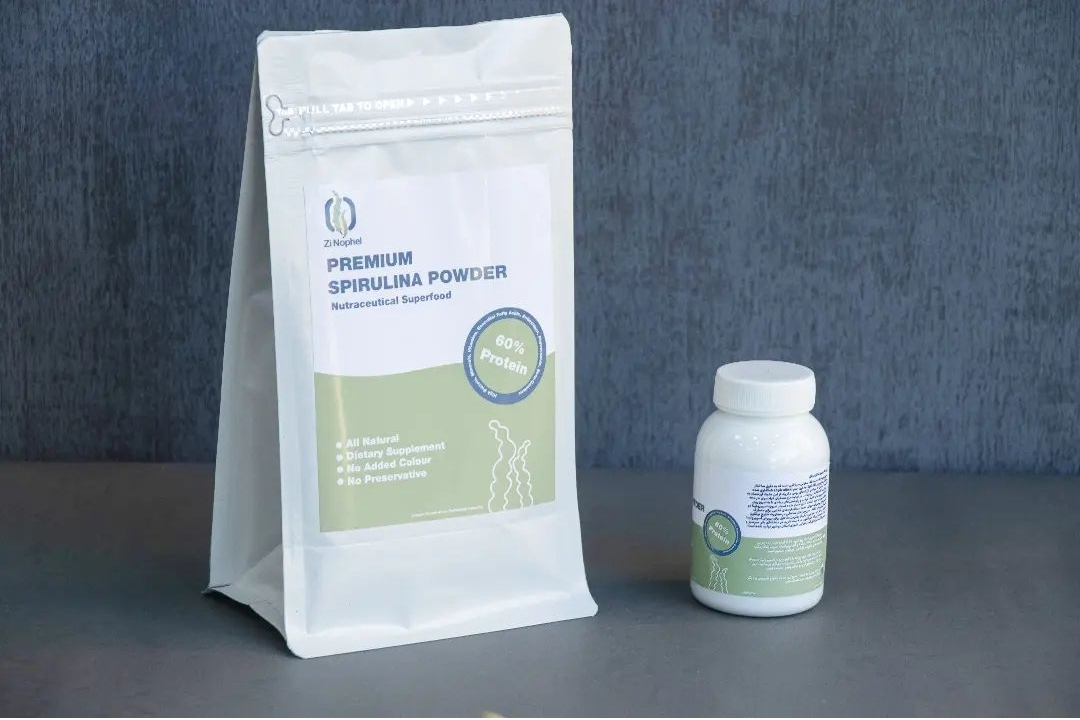

Spirulina Powder: A Superfood with a Rich Nutritional Profile and Enduring Benefits Spirulina powder, derived from the blue-green microalgae Spirulina, has garnered significant attention in recent years for its exceptional nutritional content and potential health benefits. Dating back to ancient civilizations like the Aztecs and Kanembu people, Spirulina has a rich historical background, having been […]
Spirulina powder, derived from the blue-green microalgae Spirulina, has garnered significant attention in recent years for its exceptional nutritional content and potential health benefits. Dating back to ancient civilizations like the Aztecs and Kanembu people, Spirulina has a rich historical background, having been used as a dietary staple. In contemporary times, the rise of health-conscious lifestyles and interest in sustainable superfoods has propelled Spirulina powder to popularity. Its versatile applications in various culinary creations, coupled with a reputation as a nutrient-dense supplement, have contributed to its widespread usage in the modern wellness landscape.
Spirulina powder boasts an impressive nutritional profile, making it a standout superfood in the health and wellness community. Firstly, it is renowned for its exceptional protein content, often surpassing that of traditional protein sources like meat or eggs. Spirulina is a complete protein, meaning it contains all essential amino acids necessary for the body’s functioning. Additionally, it serves as a rich source of vitamins, including B-complex vitamins such as B12, essential for energy metabolism, and minerals like iron and magnesium, crucial for various bodily functions.
In terms of antioxidants, Spirulina is a powerhouse. It contains a variety of antioxidants, including phycocyanin, chlorophyll, and beta-carotene, which help combat oxidative stress and inflammation in the body. These antioxidants not only contribute to Spirulina’s vibrant blue-green color but also play a vital role in promoting overall health and well-being.
When comparing Spirulina with other superfoods, it often stands out due to its unique combination of nutrients. For instance, Spirulina has a higher protein content than most plant-based sources, making it an excellent choice for vegetarians and vegans. Its diverse nutrient profile sets it apart, providing a comprehensive array of essential vitamins, minerals, and antioxidants that contribute to its status as a nutritional powerhouse among superfoods.

Spirulina powder offers a range of health benefits that have captured the attention of wellness enthusiasts. One notable advantage is its potential to bolster the immune system. Packed with a variety of vitamins, minerals, and antioxidants, Spirulina supports the body’s defense mechanisms, helping to ward off infections and illnesses. The high concentration of nutrients, including beta-glucans and phycocyanin, contributes to the immune-boosting properties of Spirulina, making it a valuable addition to one’s overall health regimen.
Beyond immune support, Spirulina is often praised for its detoxification and cleansing properties. The chlorophyll content in Spirulina is known for its ability to bind to and eliminate toxins from the body, aiding in the natural detoxification process. This makes Spirulina a potential ally in supporting liver function and promoting overall bodily purification. Regular consumption may contribute to a cleaner, more efficient internal environment.
Moreover, Spirulina exhibits potential anti-inflammatory effects. The phycocyanin pigment, responsible for Spirulina’s blue-green hue, has been studied for its anti-inflammatory and antioxidant properties. These qualities may help mitigate inflammation in the body, providing relief for conditions associated with chronic inflammation. Additionally, some research suggests that Spirulina may play a role in reducing oxidative stress, contributing to its anti-inflammatory potential.
In terms of weight management, Spirulina’s nutrient density and protein content may offer benefits. Protein is well-known for its role in promoting satiety and supporting muscle maintenance, which can be beneficial for those looking to manage their weight. The nutritional richness of Spirulina makes it a nutrient-dense addition to a balanced diet, potentially aiding individuals in their weight management efforts.
Spirulina powder is a versatile ingredient that can be incorporated into a variety of recipes, from smoothies and shakes to energy balls and salad dressings. Its subtle flavor complements both sweet and savory dishes, making it a versatile way to add nutrients and visual appeal to your meals. Start with small amounts and gradually increase to avoid overpowering the flavor of your dish.
The production of Spirulina is characterized by its eco-friendly and sustainable nature, contributing to its appeal in the wellness and nutrition sectors. Spirulina is often cultivated in controlled environments like ponds, tanks, or photobioreactors, where it thrives in alkaline water rich in minerals. This cultivation method allows for year-round production, minimizing the environmental impact associated with traditional agriculture. Furthermore, Spirulina’s rapid growth rate and high yield per unit of cultivation area make it an efficient and sustainable source of nutrition.
While Spirulina cultivation offers environmental benefits, it is essential to acknowledge and address potential challenges. Issues such as water pollution, energy consumption, and the use of non-renewable resources in production can pose sustainability challenges. To mitigate these concerns, producers are increasingly adopting environmentally conscious practices, such as recycling water and utilizing renewable energy sources. When choosing Spirulina products, consumers can contribute to sustainability efforts by opting for brands that prioritize eco-friendly practices, transparent sourcing, and adherence to ethical standards. Look for certifications such as organic, non-GMO, or those indicating sustainable farming practices to ensure your Spirulina purchase aligns with your environmental values.

While Spirulina is generally regarded as safe for most individuals, it’s important to be aware of potential side effects and take necessary precautions. Allergies and sensitivities to Spirulina can occur, albeit rarely. Individuals with a history of allergies to seafood or other blue-green algae should exercise caution, as cross-reactivity may lead to allergic reactions. It’s advisable for new users to start with a small amount and monitor their body’s response before incorporating larger quantities into their routine.
Spirulina’s interaction with medications is another consideration. As with any supplement, it’s crucial to consult with a healthcare professional, especially for individuals taking medications or those with pre-existing medical conditions. Spirulina may interact with immunosuppressants, anticoagulants, and certain medications metabolized by the liver. Additionally, pregnant or breastfeeding individuals should seek guidance from their healthcare providers before incorporating Spirulina into their diets. Establishing a recommended dosage is challenging due to individual variations, but general guidelines suggest starting with a modest amount, such as one teaspoon per day, and gradually increasing to assess tolerance. Practicing moderation and heeding professional advice ensures a safe and beneficial experience with Spirulina supplementation.
Spirulina is widely acclaimed for its positive effects on energy levels, immunity, and overall well-being. However, some individuals may experience challenges, such as a strong flavor or digestive discomfort. To address these issues, gradually incorporate Spirulina into recipes, disguise its taste in smoothies, ensure proper hydration, and consult a healthcare professional for personalized guidance.
Conclusion
In conclusion, Spirulina powder stands out as a remarkable superfood, offering a compelling combination of nutritional value, potential health benefits, versatility, and sustainability. Its rich protein content, abundance of vitamins, minerals, and antioxidants, and purported immune-boosting, detoxifying, and anti-inflammatory properties make it a valuable addition to a balanced diet. Moreover, its culinary versatility allows for seamless integration into various dishes, from smoothies to energy balls, while its sustainable production practices align with modern wellness trends. While potential side effects and interactions with medications warrant careful consideration, Spirulina powder holds promise as a beneficial and eco-friendly supplement for individuals seeking to enhance their overall health and well-being.
In conclusion, Spirulina powder stands out as a remarkable superfood, offering a compelling combination of nutritional value, potential health benefits, versatility, and sustainability. Its rich protein content, abundance of vitamins, minerals, and antioxidants, and purported immune-boosting, detoxifying, and anti-inflammatory properties make it a valuable addition to a balanced diet. Moreover, its culinary versatility allows for seamless integration into various dishes, from smoothies to energy balls, while its sustainable production practices align with modern wellness trends. While potential side effects and interactions with medications warrant careful consideration, Spirulina powder holds promise as a beneficial and eco-friendly supplement for individuals seeking to enhance their overall health and well-being.